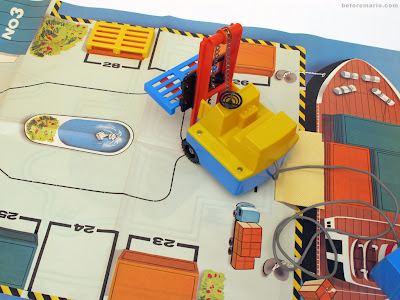These toys answered the market demand for more sophisticated, and increasingly expensive, high quality gifts.
Nintendo Power Lift - a remote controlled forklift - is another example of this.
 |
| Nintendo Power Lift (1973) |
Power Lift was introduced in 1973, and retailed for ¥2,980.
The Japanse katakana for 'Power Lift' (パワーリフト) is pronounced as 'pawaa rifuto'.
The logo on the box contains a visual joke: the dash (ー) prolonging the 'wa' (ワ) sound, is pictured like a little forklift, carrying the 'ri' (リ) character next to it.
The English name is styled to show that the Power Lift can move in multiple directions. Nintendo really went to town with the graphical design of the box.
A picture on the side of the box shows the contents of the set.
Besides the Power Lift and the remote control, a detachable fork and two plastic pallets (blue and yellow) are provided.
Furthermore, a playing field and sticker sheet are included.
The instructions are printed on the inside of the box top.
The fork attaches easily to the forklift, and the Power Lift is ready to play.
The forklift has two large front-wheels and a small back-wheel, for maximum manoeuvrability.
The remote control is connected to the forklift by an electrical chord that is about one meter long.
The Power Lift does not have wireless controls like Lefty RX, but it also has more control functions: a total of six functions, compared to only two for Lefty RX. It would have required (too) complex radio-graphics technology to handle the Power Lift wirelessly, which would have pushed up the production cost.
As it is, the control through the cord works pretty well. It also helps that the Power Lift does not move very fast.
The body of the Power Lift comes plain, without any detailing or decoration. This can be added using the provided stickers.
 |
| Power Lift sticker-sheet |
The Power Lift contains no less than three electro-motors.
One motor is used to move the fork up and down, and the other two to power the front-wheels.
These motors can be controlled independently of each other, with the switches on the remote control.
The remote control also houses the battery compartment. The Power Lift runs on two D (UM-1) cells.
The box shows all control options.
The first two switches control the left and right front-wheel. The Power Lift moves forward or backward by pushing these two switches in the same direction at the same time. To turn left or right, the switches need to be pushed independently.
The third switch operates the fork.
It is possible to move the fork up or down while driving the Power Lift forward or backward. A sharp 360 degree turn in place can be made by pushing the move switches in opposite directions.
The Power Lift came with a printed paper playing field.
One side depicts a harbour scene, which can be used to drill your loading and unloading skills.
The other side contains a number of tracks, excellent for showing off your driving aptitude.
Following the lines exactly isn't easy. It takes some practice to move the Power Lift around.
Power Lift was initially released with a slightly different box design than the one shown above.
 |
| The two Power Lift box versions |
The most prominent difference between the two versions is the photo on the front, which shows a different child. In the update Nintendo went for a more boy-ish picture.
 |
| Power Lift (first edition) |
There are some other smaller differences as well. The picture showing the set contents was updated to also show the paper playing field, which was included in the first edition, but not listed on the box.
The first release was labeled "Industry Toy Series" (産業トイ シリーズ), while the update was simply called "Industry Toy".
 |
| The first release of Power Lift was labelled as part of the Industry Toy Series |
Apparently Nintendo had plans for the Power Lift to be part of a series of simliar toys, but later dropped this idea.
The basic control setup of the Power Lift allowed for a simple and relatively cheap design, but at the same time provided a fun and realistic way to operate your very own forklift.




























I'd love to see _this_ in a future Mario Party game.
ReplyDeleteOr Wii Party (If the series ever gets another sequel, which is very unlikely 😔)
DeleteI've seen it in an ad on the final Doraemon '73 episode, which has been found in audio form.
ReplyDelete